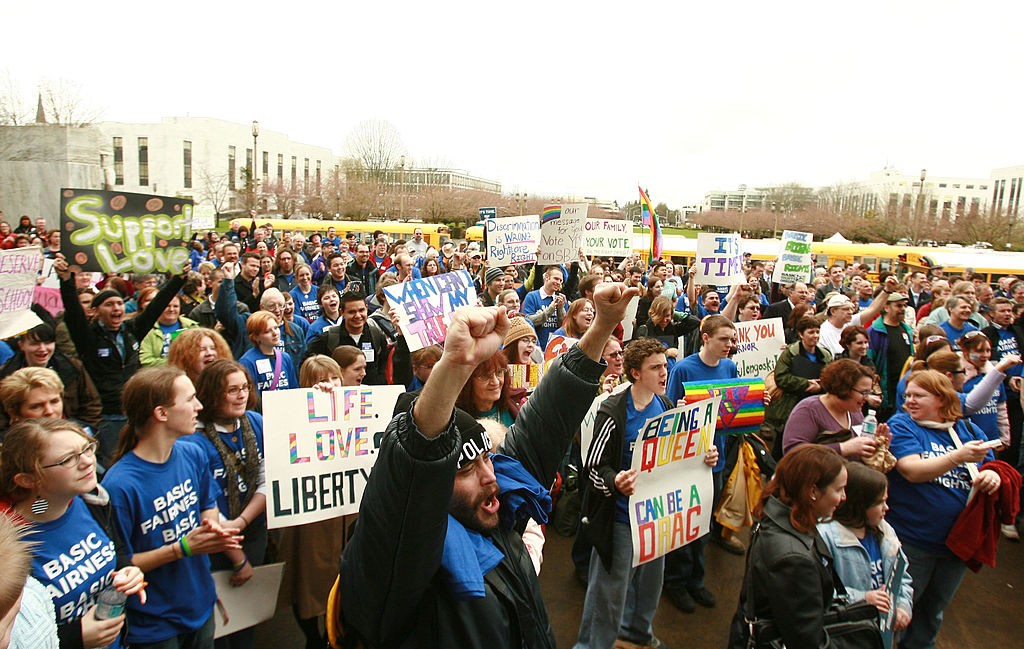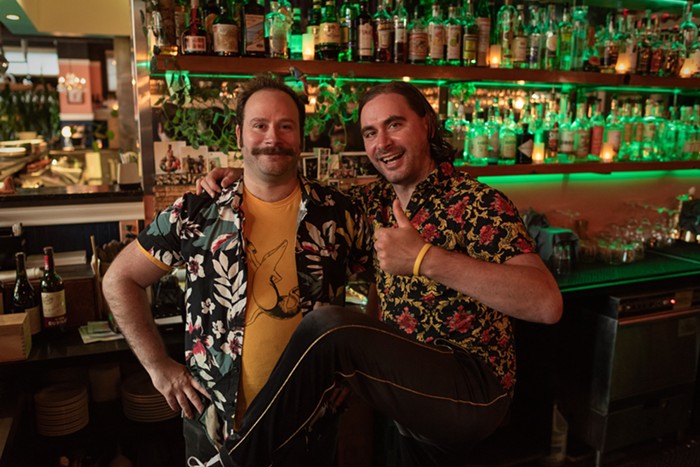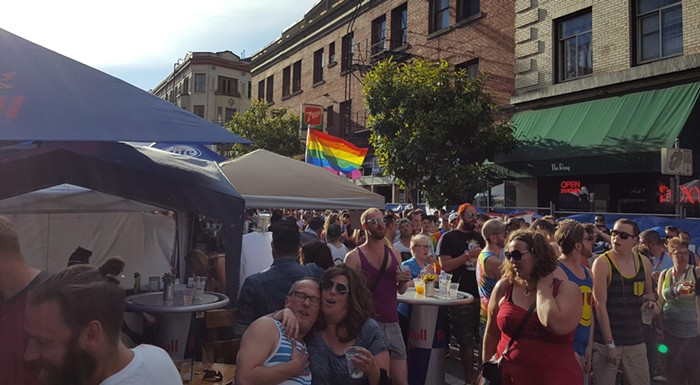The Mercury's 2024 Queer Guide: Endless Queer Summer
Rainbow signs in windows are legion, and Portland's queer summer is endless.
All Pride All the Time
There’s something happening every weekend, as we count down to Portland Pride!
Kathleen Hanna Is Making a Documentary About Darcelle XV
Fun fact: The riot grrrl punk singer is Walter Cole's second cousin.
Q Marks the Spot
For two decades, the Q Center has been a safe haven for the LGBTQ2SIA+ community—and they have even bigger dreams for the future.
Find Queer Comedy Tonight!
Our roundup of the best queer (and queer adjacent) comedy shows in Portland.
We Are in Cinema's Golden Age of the Lesbian Dirtbag
Celebrate Pride with lesbian cinema! Without crying, for once!
EverOut's 2024 Pride Event Calendar
Don't miss a minute of fun during this year's Queer Summer!
QUEER PUZZLE PAGE!
You don't have to be queer to figure out these puzzles... but it helps!
This Portland Gay Bar Is Opening a Family-Friendly LGBTQIA+ Lounge
Since spring, we've wondered about "Scandals East." Here's the plan.
THE TRASH REPORT: Pride Edition
Target Is Canonically Gay! Did the Founding Fathers Kiss Dudes?
A Portland Drag Clown in Residence at the Venice Biennale
Artist Jeffery Gibson invited Carla Rossi to climb his installation on the US pavilion.
Queer Bars in Portland, a History
Silverado was once Flossie's; Lowensdale Park was once a place to cruise—take a brief dive into a history of our city's queer spaces.
Mona Chrome Is—Ironically Enough—a "Walking Crayon Box"
Gary Barnes sees drag as a way to combine their passions for painting, costume design, and dance—all at once!
Cocktail-Coded
Northeast Portland neighborhood wine bar Bonne Chance built a queer clientele on allyship and Malört.
Queer Guide Comic: COVID-Safer Pride Guide
Protect your ability to party—and protest—this Pride!
Queer Eye for the Pedalpalooza Ride
Portland leads the way in welcoming riders of all genders and sexualities.
The Long Road to Justice
As the American legal landscape for LGBTQ+ residents grows hostile, Oregon works to enshrine rights for all.
Where to Find a Queer-Owned Bar or Restaurant Near You
Fourteen spots to try during Portland Pride Summer—and beyond!
The Future of HIV Treatment Is Injectable
Promising prugs could expand treatment–if we get out of our own way.
[Find the Mercury's Queer Guide in print—available in more than 500 spots citywide!—eds.]
In 2023 Oregon House Bill 2002 was hailed as transformative, crucial legislation for protecting the rights of women and LGBTQ+ residents.
The reproductive health care bill protects doctors from prosecution, ensures a patient’s right to abortion at any age without requiring parental notification, and requires insurers to cover gender-affirming care, including surgeries, among other provisions.
But now, as trust in the Supreme Court is waning, and the US gears up for a pivotal election this November, some of the same organizations who pushed to get HB 2002 passed by the legislature say the work isn’t over.
Oregon is considered one of the most supportive states for queer and transgender people. The Human Rights Campaign ranks it among 21 states with “a broad range of protections to ensure equality for LGBTQ+ people, including comprehensive non-discrimination laws, safer school policies, and healthcare access for transgender people.”
With a lesbian governor, a plethora of Pride celebrations each summer, and mandated insurance coverage for gender-affirming health care, Oregon has become a safe haven for residents fleeing homophobic and transphobic laws in other states.
But activists say—in the wake of Roe v. Wade being overturned—the same movement that’s coming after abortion is also coming after transgender rights and health care.
Oregon’s Democrat senators note that during the 2023 legislative session, seven anti-LGBTQ+ bills were introduced. Moreover, a wave of recent legislation in other states targeting transgender youth and drag queens has local civil rights groups on high alert.
Kelly Simon is the legal director for the American Civil Liberties Union (ACLU) of Oregon. Simon says Oregon’s protections “aren’t robust in the way they need to be to fully protect people in the current legal landscape.”
Much of that could be fixed by codifying or clearly defining terms in existing laws, to make sure they protect everyone.
“In Oregon we have an equal rights amendment that prohibits the denial or abridgement of rights based on sex,” Simon says. “But that definition should clarify that sex includes gender identity, pregnancy outcomes, and sexual orientation.”
Simon says the most impactful thing Oregon can do to insulate itself from regressive or draconian federal laws is enshrine LGBTQ+ rights in its state constitution. But even that needs work.
“Oregon’s constitution still has, in its definition of marriage, that marriage is between a man and a woman,” she notes.
While gay marriage isn’t likely to be challenged or overturned at the federal level, the ACLU is monitoring other basic rights, like access to gender affirming care, that have come before the courts.
“Right now, the kind of questions before the courts are: Does denying health care or the right to participate in school programs for certain people violate certain state laws, or federal laws, or do they violate the constitution?”
Beyond the complex system of laws that varies from state to state, advocates say Oregon’s affirmation of queer rights needs to go beyond what’s on paper.
“Something we talk about is the difference between legal equality and lived equality,” says Blair Stenvick, communications manager for Basic Rights Oregon. “I think at the state level, relative to all other 50 states, we’re doing quite well, but every community is different. Even in the most affirming and welcoming communities, there are still pockets of backlash.”
Basic Rights Oregon works to secure critical legislative policies that protect and benefit LGBTQ+ Oregonians. Lately, much of the organization’s focus has been on trans, non-binary, and queer youth.
“We know that a lot of anti-LGBTQIA+ as well as racist policies work their way up from the local level, particularly with school boards,” Stenvick says. “Last year, for the first time, we got a lot more actively involved in school board races—particularly in swing districts across the state. We realized that no matter how much work we do at the state level, if kids don’t have school board members who also support their right to exist and feel safe and affirmed at school, that state legislation can only do so much.”
Oregon drew national attention in 2021 when the board of education for Newberg School District voted to ban displays of Black Lives Matter and Pride flags. The board rescinded the vote shortly afterward, following backlash, but the same district again came under fire when a teacher was disciplined for showing up to school in blackface.
More recently, a slate of Republican lawmakers in Oregon called for a change in state policy regulating athletic competitions, to prevent transgender girls from competing in the female divisions of school sports matches.
But even as the legal landscape for LGBTQ+ Americans becomes more hostile across the United States, advocates say there’s still reason to celebrate.
Stenvick points to cultural changes that make it easier for trans and queer people to be visible and live authentically—a stark contrast from 15 years ago.
“I think the thing that gives me hope when looking at the national landscape is there wouldn’t be this backlash if we hadn’t already made big progress,” Stenvick says. “You can make life very hard for trans people, but we’re still going to exist and we’re still going to be trans.” ν




















